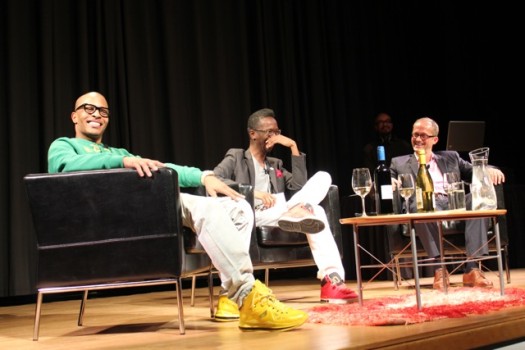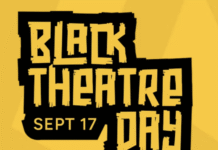
(Photo Credit: DJ Blak Magic)
Grammy-winning hip hop superstar T.I. and High Museum of Art curator Michael Rooks recently spoke about an intersection between both fine art and Hip-Hop being accepted into mainstream culture. Their town hall meeting at Woodruff Arts Center, “InterSessions: Art X Hip Hop,” gave both curators the opportunity to talk about how they achieve creative license in their careers.
Moderated by visual artist Fahamu Pecou, T.I. and Rooks gave personal accounts about their orientation in their fields. The three men, over glasses of wine, also drew distinctions between high and low culture and how geography influences their cultural production. The panelists interrogated and unraveled that art and hip hop are not isolated from each other.
Pecou opened the discussion telling a story about creating a work in his dorm inspired by his deceased mother. At the time listening to Goodie MOB’s “Guess Who,” the song’s subject matter dealt with the impact each member of the quartet’s mothers had on their development. Pecou affectionately says, “Art is more than just pretty pictures. It’s something that connects people,” he says.
T.I., dressed in a green hoodie and bright yellow sneakers, was an impressionable kid that was introduced to hip hop by way of older uncles and cousins. The Atlanta-born lyricist born Clifford Harris, Jr. remembers hearing LL Cool J’s “I’m Bad,” learning the lyrics and having to perform the song for his family’s company. That moment laid the foundation for one of the most charismatic and successful hip hop artists in the digital era to start rapping. “I have influence. There is a place for me regardless of where I come from or my demographic. Art is a reflection of your environment and who you are as a person. It’s our choice to show how we are affected,” says T.I. with his signature Southern drawl.
Rooks grew up the only boy in his Illinois home. The introvert, majoring in Art History at the Art Institute of Chicago, discovered his homosexuality at a young age but craved to find an avenue for self-empowerment. Revealing that he “sucked at painting,” Rooks found his place in the art world after seeing a sculpture park made of toxic waste.
Rooks’ position at the High Museum, as well as his previous posts at Haunch of Venison, Honolulu Museum of Art and Museum of Contemporary Art Chicago, requires him to oversee collections and create programs that bring fresh perspectives to modern art. “The audience is a really important part of the equation. I could be a good audience and become someone who could respond and reflect on how art moves. I like to get in the community and hear what the artists are thinking about. It’s about being a mirror of reflection,” says Rooks. Furthermore, T.I. agrees that the audience is an important element to his success as well as any successful hip hop act. “If I don’t get no energy from y’all, then I don’t wanna do this anymore,” he says.
T.I.’s infectious singles like “Rubber Band Man,” “24’s,” “What You Know,” “Live Your Life,” “Swagga Like Us” and “Whatever You Like” among others have elevated the “King of the South” from being an artist adored by the streets to peaking atop the Billboard charts. Though T.I’s craft has amassed him a fortune, the rapper strives to keep his music at the core. Hit records, T.I. says, comes from having a passion for making music people can relate to. “You don’t even think about it. In music, what we’ve gotten away with is applying a formula to make income. If you’re in it to make money, you’re diluting the art in the first place,” he says.
Pecou, T.I. and Rooks collectively made countless references to Jean-Michel Basquiat, Andy Warhol, Keith Haring and even The Notorious B.I.G. regarding how their intellectual property evolved from being virtually unknown to being embraced by mass culture. Similarly, hip hop culture went from being a lifestyle and collection of art practiced by disenfranchised youth of color to becoming the most important American cultural form since jazz.
“It’s just as significant as Shakespeare. Art found a way to escape negative circumstances. It took minds off being poor. You could make yourself look cool. Artists just try to find something we can all relate to,” he says.
Like many of his contemporaries, T.I.’s massive success has allowed him to leverage his popularity into numerous film and television roles, three clothing lines, need-based scholarships and a construction company that repairs homes in low income Atlanta neighborhoods. His evolution across numerous platforms is second nature to him.
Using hip hop as both entrepreneurship and artistry, T.I. adds, allows him to reveal other sides to his personality. “This is now the cool factor. Nobody knew what it was supposed to sound or look like. There isn’t one way that could articulate my life experiences. Art allows us to go as far or straight down the middle as we like to,” he says.
Rooks concurs. “Hip hop culture has always survived. It had to grow up. It’s become so relevant, artists were taking notes around the world. It’s transcended boundaries,” he says.
This post was written by Christopher A. Daniel, pop cultural critic and music editor for The Burton Wire. He is also a contributing writer for Urban Lux Magazine and Blues & Soul Magazine. Follow Christopher @Journalistorian on Twitter.
Like The Burton Wire on Facebook. Follow us on Twitter @TheBurtonWire.








